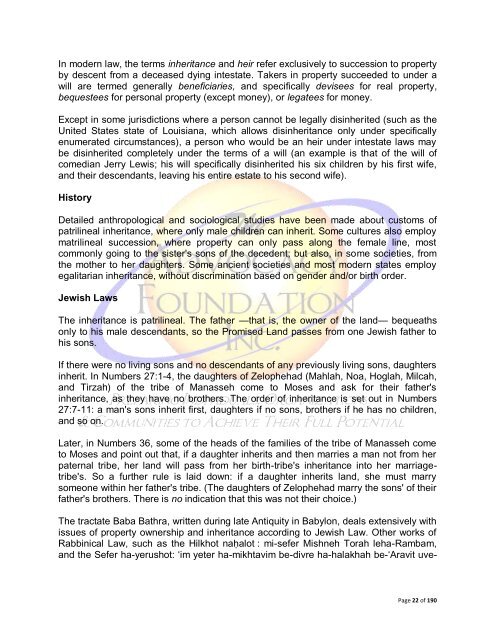Wills, Trusts & Estates
Wills, Trusts & Estates
Wills, Trusts & Estates
Create successful ePaper yourself
Turn your PDF publications into a flip-book with our unique Google optimized e-Paper software.
In modern law, the terms inheritance and heir refer exclusively to succession to property<br />
by descent from a deceased dying intestate. Takers in property succeeded to under a<br />
will are termed generally beneficiaries, and specifically devisees for real property,<br />
bequestees for personal property (except money), or legatees for money.<br />
Except in some jurisdictions where a person cannot be legally disinherited (such as the<br />
United States state of Louisiana, which allows disinheritance only under specifically<br />
enumerated circumstances), a person who would be an heir under intestate laws may<br />
be disinherited completely under the terms of a will (an ex<strong>amp</strong>le is that of the will of<br />
comedian Jerry Lewis; his will specifically disinherited his six children by his first wife,<br />
and their descendants, leaving his entire estate to his second wife).<br />
History<br />
Detailed anthropological and sociological studies have been made about customs of<br />
patrilineal inheritance, where only male children can inherit. Some cultures also employ<br />
matrilineal succession, where property can only pass along the female line, most<br />
commonly going to the sister's sons of the decedent; but also, in some societies, from<br />
the mother to her daughters. Some ancient societies and most modern states employ<br />
egalitarian inheritance, without discrimination based on gender and/or birth order.<br />
Jewish Laws<br />
The inheritance is patrilineal. The father —that is, the owner of the land— bequeaths<br />
only to his male descendants, so the Promised Land passes from one Jewish father to<br />
his sons.<br />
If there were no living sons and no descendants of any previously living sons, daughters<br />
inherit. In Numbers 27:1-4, the daughters of Zelophehad (Mahlah, Noa, Hoglah, Milcah,<br />
and Tirzah) of the tribe of Manasseh come to Moses and ask for their father's<br />
inheritance, as they have no brothers. The order of inheritance is set out in Numbers<br />
27:7-11: a man's sons inherit first, daughters if no sons, brothers if he has no children,<br />
and so on.<br />
Later, in Numbers 36, some of the heads of the families of the tribe of Manasseh come<br />
to Moses and point out that, if a daughter inherits and then marries a man not from her<br />
paternal tribe, her land will pass from her birth-tribe's inheritance into her marriagetribe's.<br />
So a further rule is laid down: if a daughter inherits land, she must marry<br />
someone within her father's tribe. (The daughters of Zelophehad marry the sons' of their<br />
father's brothers. There is no indication that this was not their choice.)<br />
The tractate Baba Bathra, written during late Antiquity in Babylon, deals extensively with<br />
issues of property ownership and inheritance according to Jewish Law. Other works of<br />
Rabbinical Law, such as the Hilkhot naḥalot : mi-sefer Mishneh Torah leha-Rambam,<br />
and the Sefer ha-yerushot: ʻim yeter ha-mikhtavim be-divre ha-halakhah be-ʻAravit uve-<br />
Page 22 of 190

















